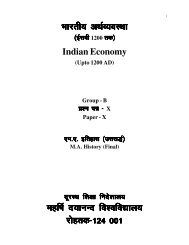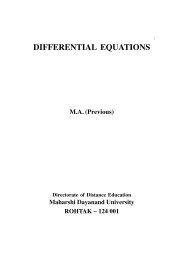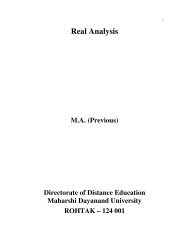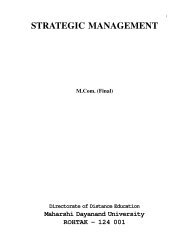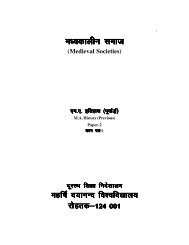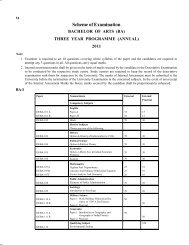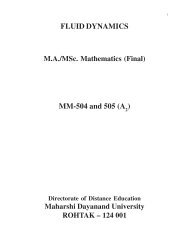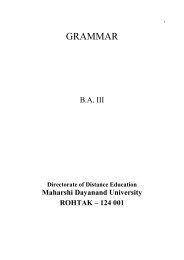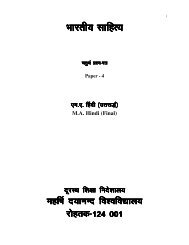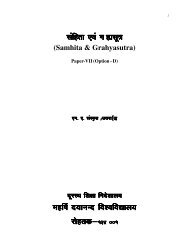LITERATURE AND GENDER - Maharshi Dayanand University, Rohtak
LITERATURE AND GENDER - Maharshi Dayanand University, Rohtak
LITERATURE AND GENDER - Maharshi Dayanand University, Rohtak
Create successful ePaper yourself
Turn your PDF publications into a flip-book with our unique Google optimized e-Paper software.
Girish Karnad – NagamandalJokumaraswainy, directed in Kannada by B.V. Karanth, for the Open-Air Festival in Bangalore in 1972.Karnad has also published a number of articles, the most significant being “In Search of a New Theatre” inContemporary Indian Tradition, ed. Carla Borden (Washington: Smithsonian Press, 1988) and “Theatre in India,”in Daedalus, Vol. 118, No. 4, pp. 331-52.While as Karnad is a multi-faceted personality, it is essentially as a playwright that he is at his best. He confesses, ‘Ihave been fairly lucky in having a multi-pronged career. You know, I’ve been an actor, a publisher, a film-maker. Butin none of these fields have I felt quite as much at home as in playwriting.” In India, unfortunately, the writers cannotlive on their writing alone; it does not yield enough royalties for sustenance. Says Karnad, “One can’t earn a comfortableliving even from a successful play. Take Tughlaq. As you know, it’s been enormously successful --critically as wellas in performance. Playwrights in the West have been able to retire on such successes--or at least, to devotethemselves to that activity entirely. I can’t.”Today Girish Karnad is considered one of the most significant Indian dramatists. He has enriched the Indian literaryscene by his contribution to art, culture, theatre and drama. It is most befitting that Karnad has been conferred by thePresident of India, the prestigious awards, Padma Shri in 1974 and Padmabhushan in 1992. Also, he received theGubbi Veeranna Award from the Government of Karnataka in 1997.Karnad is based in Bangalore and lives with his wife, a medico, and his two children-a daughter and a son-both in theirteens. He keeps shuttling between Bangalore, Bombay and Delhi as the three metropolitan cities abundantly offerhim opportunities for creative writing, acting in films, and directing serials for national television.Karnad is not impulsive by temperament, and does not resort to writing just at the flash of an idea. He follows agolden mean of thought and action when he launches on a new play. Commenting on the character of Horatio,Hamlet says that those persons are indeed blessed in whom “blood and judgement are so well commingled” that theyare not treated by fortune as a musical instrument on which Fortune may play at will mid from which Fortune may beable to produce whichever tune she wishes to produce. The classical qualities of balance and restraint are true of theperson of Karnad too. He is a genius as a writer, man of excellent disposition. And one in whom all the four elements,to use a Renaissance analogy are so well-mixed that Nature may stand up and say “Here’s a man.”Girish Karnad - Placement and Hierarchy in Indian DramaWhile attempting a study of Indian Drama in the post independence period we need to deal with two factors, theimpact of independence on the writers of post independence, the assimilation of all regional literature under thebanner of Indian literature. It can be noted with a sense of pride that the major Indian Playwrights of this era camefrom different states and have written in their own regional languages. Apart from Mohan Rakesh who wrote inHindi, Vijay Tendulkar wrote in Marathi, Badal Sircar in Bangla and Girish Karnad in Kannad.The two-fold tradition of Ancient Indian Theatre, that is the classical and the folk, provides a background to the playsof all the writers mentioned above. Inevitably, Modern Indian Theatre is influenced by the Euro-American theatre butmost of the modern playwrights have been able to retain the ‘Indianness’ of the themes. The western influence hasnot damaged or weakened the substance of the plays, the bewilderment of the man and the absurdity of life havebeen conveyed through a medium, which comes home to the reader, foreigner or Indian with equal ease.In the introduction to the ‘Flowering of Indian Drama’, K. Venkata Reddy and R.K Dhawan, while tracing the historyof Indian Drama say,“—as a genre, Sanskrit Drama is essentially romantic in its impulsion and expansion. And with itspredilection for comedy, it generally concludes on a note of peace, calm and quiet. The emotionalimpact of the play on the audience normally settles down into a condition of aesthetic delectationand purposive repose. It is not concerned with mere realism in incident and character, norpreoccupied with outer forms of appearance, sequences and other mechanics, but geared to strivethrough shadow, symbol and gesture to reach at the truth behind the apparent”K.K Sriniwasa Iyengar who observes in ‘ Drama in Modern India’,” …. A long discipline, a world of symbolism, a39



